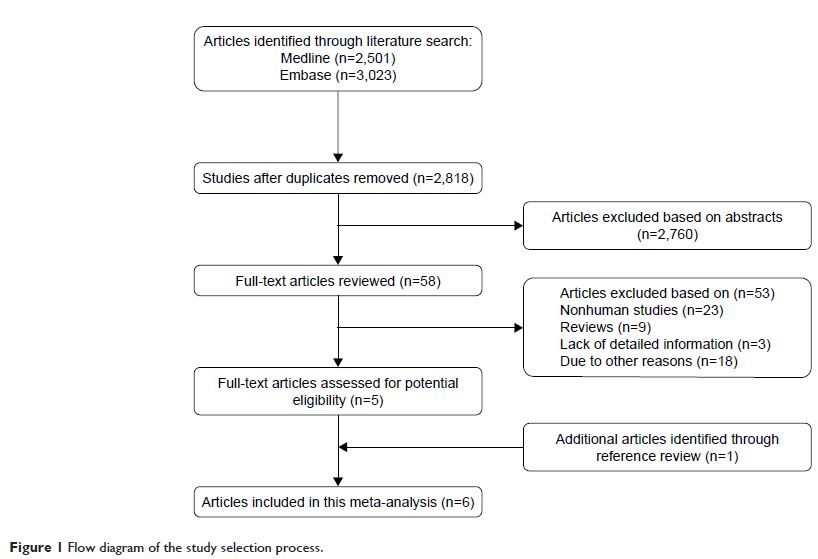108985
论文已发表
注册即可获取德孚的最新动态
IF 收录期刊
- 3.4 Breast Cancer (Dove Med Press)
- 3.2 Clin Epidemiol
- 2.6 Cancer Manag Res
- 2.9 Infect Drug Resist
- 3.7 Clin Interv Aging
- 5.1 Drug Des Dev Ther
- 3.1 Int J Chronic Obstr
- 6.6 Int J Nanomed
- 2.6 Int J Women's Health
- 2.9 Neuropsych Dis Treat
- 2.8 OncoTargets Ther
- 2.0 Patient Prefer Adher
- 2.2 Ther Clin Risk Manag
- 2.5 J Pain Res
- 3.0 Diabet Metab Synd Ob
- 3.2 Psychol Res Behav Ma
- 3.4 Nat Sci Sleep
- 1.8 Pharmgenomics Pers Med
- 2.0 Risk Manag Healthc Policy
- 4.1 J Inflamm Res
- 2.0 Int J Gen Med
- 3.4 J Hepatocell Carcinoma
- 3.0 J Asthma Allergy
- 2.2 Clin Cosmet Investig Dermatol
- 2.4 J Multidiscip Healthc

已发表论文
牙齿脱落与结直肠癌的风险: 前瞻性队列研究中剂量反应的荟萃分析
Authors Ma P, Dai S, Jin C, Yao Y, Zou C
Received 6 September 2017
Accepted for publication 30 January 2018
Published 21 March 2018 Volume 2018:11 Pages 1617—1623
DOI https://doi.org/10.2147/OTT.S151028
Checked for plagiarism Yes
Review by Single-blind
Peer reviewers approved by Dr Akshita Wason
Peer reviewer comments 2
Editor who approved publication: Dr Faris Farassati
Background: Previous
studies have indicated that tooth loss is associated with colorectal cancer
risk but have presented controversial results.
Methods: We conducted a dose–response meta-analysis in order to investigate the correlation between tooth loss and colorectal cancer risk. Up to August 2017, six eligible studies were included in this meta-analysis.
Results: Our results showed statistically significant association between tooth loss and colorectal cancer (OR =1.08, 95% CI: 1.03–1.15, P <0.001). In addition, we obtained the best fit at an inflection point of every two tooth loss in piecewise regression analysis, and the summary relative risk (RR) of colorectal cancer for an increase of every two tooth loss was 1.06 (95% CI: 1.02–1.11, P <0.001). Furthermore, tooth loss was significantly associated with colorectal cancer risk in Caucasia (RR: 1.18; 95% CI: 1.09–1.28; P <0.001) and Asia (RR: 1.06; 95% CI: 1.02–1.10; P <0.001). Moreover, tooth loss was significantly associated with a higher risk of colon cancer (RR: 1.09; 95% CI: 1.02–1.17; P <0.001) and rectal cancer (RR: 1.08; 95% CI: 1.01–1.17; P <0.001).
Conclusion: Subgroup meta-analyses showed consistency with the primary findings. Considering these promising results, increasing tooth loss may be harmful to our health, and maintenance of our oral health is essential.
Keywords: colorectal cancer, tooth loss, dose–response relationship, meta-analysis
Methods: We conducted a dose–response meta-analysis in order to investigate the correlation between tooth loss and colorectal cancer risk. Up to August 2017, six eligible studies were included in this meta-analysis.
Results: Our results showed statistically significant association between tooth loss and colorectal cancer (OR =1.08, 95% CI: 1.03–1.15, P <0.001). In addition, we obtained the best fit at an inflection point of every two tooth loss in piecewise regression analysis, and the summary relative risk (RR) of colorectal cancer for an increase of every two tooth loss was 1.06 (95% CI: 1.02–1.11, P <0.001). Furthermore, tooth loss was significantly associated with colorectal cancer risk in Caucasia (RR: 1.18; 95% CI: 1.09–1.28; P <0.001) and Asia (RR: 1.06; 95% CI: 1.02–1.10; P <0.001). Moreover, tooth loss was significantly associated with a higher risk of colon cancer (RR: 1.09; 95% CI: 1.02–1.17; P <0.001) and rectal cancer (RR: 1.08; 95% CI: 1.01–1.17; P <0.001).
Conclusion: Subgroup meta-analyses showed consistency with the primary findings. Considering these promising results, increasing tooth loss may be harmful to our health, and maintenance of our oral health is essential.
Keywords: colorectal cancer, tooth loss, dose–response relationship, meta-analysis
